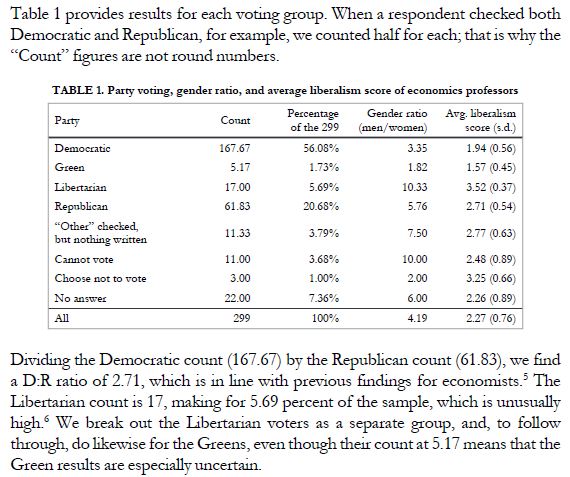The table below illustrates one reason why I remain astounded at how the “popular” view of economists has come to be what it is. I sense that the popular view paints us all as market-fundamentalist, anti-tax, anti-regulation, uber-rational, etc. supporters. If political identity actually tells us what we think it does, then that is clearly not even close to the median stance of economists.
It looks like lefty-inclined professors in economics outnumber righty inclined one by a margin of about 2 to 1. Now, I don’t think the “left-right” linear approach is a particularly effective one, but this is what we’ve got to work with here.
On the economic side of things, this representation should not be surprising if you understand that economics is not the same thing as markets or freedom. It might be the case that market supporters tend to be fluent in economics, but the converse does not follow. If economics is primarily a behavioral discipline which uses a particular set of tools to analyze the choices people make under conditions of scarcity (including information scarcity and time scarcity) then there seems nothing in the definition to suggest political affiliation of any kind. Many people are attracted to economics because it is fun, it can provide counter-intuitive and surprising insights into the world and because it gives us a sensible starting point to think about various problems.
The results should also not be surprising because universities tend to be attractive places for those left-of-center, so I am not sure that this sample is representing how “all economists” actually think about their politics. Nonetheless, it is pretty clear that people for whom “anything that is peaceful” is an important worldview are vastly outnumbered by statists of both the left and the right. And it is also pretty clear that the left vastly outnumbers the right even within the economics profession.
Do with that information what you wish. Here is the source of the table.

I would like to see it broken down into schools of thought, such as Keynes, Chicago, Austrian, New and Old Institutional, etc. I would say, I’m also not surprised when it comes to professors; what really surprises me is how many “libertarian” economists I work with. (Libertarian in quotes because I find a large difference between Libertarian politicians and libertarian economists.)
The results seem to show that “right” views are almost as prevalent among economists as “left” views, looking at the liberalism scores. I.e., 57.8% fall in the Dem/Green camp, while all the rest of the categories seem to score to the right of them, so its not 3-1, but almost evenly split. Of course, I’m not sure how to interpret a score of 1.94 for Dems, compared to your average Dem on the street, but I’d imagine even for them the score would be to the right of the average Dem voter.
The favorite economist list seems interesting, and shows that even for Dems it can’t be so clear cut as “left vs. right”. I mean, if Milton Friedman is your favorite economist, how “left” can you really be?
The only issue with this survey is that it doesn’t tell us anything about how representative this sample is; i.e. are the people who responded different from the ones who didn’t? I can imagine that the more “political” one is, the more likely one is to reply to such a survey. Also, the more “leftist” one is, the more likely one is to respond.
Also, the majority of the questions aren’t really related to “economics”, and in my opinion not very well chosen. (for example, can one be a libertarian, and be opposed to abortion on religious grounds? Of course.)